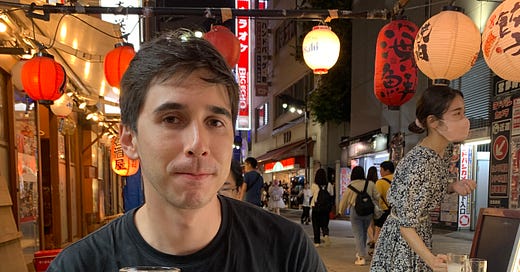Mon, Sep 16, 2024 敬老の日Keiro no He (Japanese holiday: Respect for Aged Day)
My thoughts in Tokyo
On this Japanese holiday, Keiro no He (September 16, 2024), I went out drinking with my son in the back streets of Ueno Station, a popular venue for people my son’s age. I joked, “Thanks for not taking me to die on Obasute Yama. (“mountain where granny is disposed of”). ”
“Mom! Why would I do that?” my son exclaimed.
He thought I was making up another weird Japanese cultural anecdote. But the story of taking one’s mother to die on Obasute Yama probably has roots in reality. Famine isn’t unknown in this 40,000 year old civilization. When times are tough, you can’t afford to feed unproductive family members. In one old story I know, the poor peasant is required by his lord’s law to take his elderly mother up into the mountains to die of starvation and/or exposure. People today want to forget about those harsh old days but there is still a mountain in Japan with the name Obasute Yama.
So respect for the elders or this holiday hasn’t always been a thing in Japan. The holiday Keiro no He was invented in 1966 when Japan was starting to become the economic powerhouse it is today.
On TV, announcers noted there are now over 92 thousand Japanese aged 100 years and older. There are more Japanese centenarians now than American centenarians! This is impressive considering the United States has over twice the total population of Japan. And the vast majority of Japanese centenarians are women. If you want to know more about Japanese centenarians, here’s one video:
But here are a few personal observations. As a Japanese American woman who speaks Japanese, I can be the fly on the wall while I’m visiting Tokyo. Here are my theories on why Japanese women live so long.
1) They enjoy being themselves. I see older women out shopping, eating, and visiting the baths on their own. At a coffee shop, I was surrounded by a group of elderly women loudly chattering and laughing. They didn’t appear to care anymore about being feminine or demure or polite. Of course, I’m not saying these women are slobs. Older Japanese women, especially those in Tokyo, tend to be better dressed than those older American woman I see in Seattle. But I don’t see older Japanese women trying to turn back the clock like so many American women do.
2) No pressure to be a couple. Romance seems to be out of the picture for most older Japanese women, but they don’t seem to be lonely. One factor is ratio of men to women. But also, I don’t think there is the social pressure in Japan for a woman (or man) to be part of a couple as there is in the States. Friendships and being alone seem to be as valued as romance. As a single woman, I love being able to eat out alone in Tokyo at any restaurant or cafe.
The other day, I saw Tetsuko Kuroyanagi (age 91!) on her TV talk show. She is heavily made up but she doesn’t try to be youthful or sexy like Jane Fonda. In fact, I think she’s kept the same hair style all her life. Sure, she’s a little wobbly when she’s talking with her guest but no worse than our president. I don’t think anyone here wonders about her love life. Here’s a photo of Tetsuko Kuroyanagi from last year:
3) Safety. Of course, relationships between men and women in Japan can be as complicated and fraught as they are in the US. Crime and violence are not completely unknown in Tokyo although it feels much safer than in American cities. I met a female Japanese professor who has become an expert on sexual violence in Japan. But drugs, guns, pornography and violence are heavily regulated in Japan. Tokyo is a crowded city but I never feel unsafe. I’ve dropped my handkerchief a couple of times on the train or bus, and people immediately jumped in to give it to me or get my attention.
4) Good Food. I agree with Anthony Bordain who said, ““If I had to eat only in one city for the rest of my life, Tokyo would be it.” But it’s not just the gourmet dishes served at fancy restaurants. I can find great, reasonably priced food at supermarkets, fast food restaurants, street stalls and even hole-in-the-wall places. Shopping for my dinner in Tokyo is a wonderful culinary adventure every day. Here is a photo of what I bought at the supermarket yesterday:
I find even the pre-packaged foods in Tokyo to be fresh and delicious. Maybe that’s one benefit of living in a densely populated city like Tokyo.
Japanese culture can seem like a wild kaleidoscope of ideas to Americans but I’m trying to piece out parts which might be useful. Aging is just one piece of this huge puzzle. I’ll try to write more about other parts of the puzzle. Let me know your thoughts.
.







Nice to hear from you again. Interesting thoughts.
Love your insightful tales.